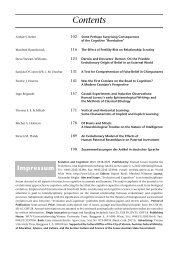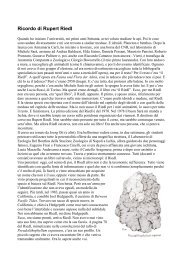The Seven Sins of Evolutionary Psychology - Konrad Lorenz Institute
The Seven Sins of Evolutionary Psychology - Konrad Lorenz Institute
The Seven Sins of Evolutionary Psychology - Konrad Lorenz Institute
You also want an ePaper? Increase the reach of your titles
YUMPU automatically turns print PDFs into web optimized ePapers that Google loves.
Minding the BrainReferencesBateson, P. P. G. (1987) Biological approaches to the study <strong>of</strong>behavioral development. International Journal <strong>of</strong> BehavioralDevelopment 10: 1–22.Bateson, P. P. G./Klopfer, P. H. (1989) Preface. In: Bateson, P.P. G./Klopfer, P. H. (eds) Whither Ethology? Perspectivesin Ethology 8. Plenum Press: New York, London, pp. v–viii.Bateson, P. P. G./Martin, P. (2000) Design for A Life: How Biologyand <strong>Psychology</strong> Shape Human Behavior. TouchstoneBooks: New York.Chorover, S. (1979) From Genesis to Genocide. MIT Press:Cambridge MA.Cosmides, L./Tooby, J. (1992) <strong>The</strong> psychological foundations<strong>of</strong> culture. In: Barkow, J/Cosmides, L./Tooby, J. (eds) <strong>The</strong>Adapted Mind. Oxford University Press: New York.Cosmides, L/Tooby, J. (1997) <strong>Evolutionary</strong> <strong>Psychology</strong>: APrimer. Retrieved on 15 Feb 2001 from the World WideWeb: http://www.psych.ucsb.edu/research/cep/primer.htmlCosmides, L/Tooby, J. (2000) <strong>Evolutionary</strong> psychology andthe emotions. In: Lewis, M./Haviland, J. (eds) <strong>The</strong> Handbook<strong>of</strong> Emotions. 2nd edition. Guilford: New York, pp.91–116.Coyne, J. (2000) Of vice and men. Review <strong>of</strong> “A Natural History<strong>of</strong> Rape” by R. Thornhill and C. Palmer. New Republic04.03.00: 27–34.Dimberg, U. (1997) Psychophysiological reactions to facialexpressions. In: Segerstråle, U./Molnar, P. (eds) NonverbalCommunication: Where Nature Meets Culture. LawrenceErlbaum: Mahwah NJ, pp. 47–60.Ekman, P./Keltner, D. (1997) Universal facial expressions <strong>of</strong>emotions: An old controversy and new findings. In: Segerstråle,U./Molnar, P. (eds) Nonverbal Communication:Where Nature Meets Culture. Lawrence Erlbaum: MahwahNJ, pp. 27–46.Eldredge, N. (1995) Reinventing Darwin. <strong>The</strong> Great Debate atthe High Table. John Wiley and Sons: New York.Fodor, J. (1983) <strong>The</strong> Modularity <strong>of</strong> Mind. MIT Press: CambridgeMA.Fodor, J. (2000) <strong>The</strong> Mind Doesn’t Work That Way. MITPress: Cambridge MA.van Gelder, T./Port, R. F. (ed) (1995) Mind as Motion: Explorationsin the Dynamics <strong>of</strong> Cognition. MIT Press: CambridgeMA.Gould, S. J. (1991) Exaptation: A crucial tool for evolutionarypsychology. Journal <strong>of</strong> Social Issues 47: 43–65.Gould, S. J. (1997a) Darwinian fundamentalism. <strong>The</strong> NewYork Review <strong>of</strong> Books, June 12: 34–37.Gould, S. J. (1997b) Evolution: the pleasures <strong>of</strong> pluralism.<strong>The</strong> New York Review <strong>of</strong> Books, June 26: 47–52.Gould, S. J. (1997c) <strong>Evolutionary</strong> psychology: An exchange.New York Review <strong>of</strong> Books, October 9.Gould, S. J./Lewontin, R. C. (1979) <strong>The</strong> Spandrels <strong>of</strong> San Marcoand the Panglossian Paradigm: A Critique <strong>of</strong> the AdaptationistProgramme. Proceedings <strong>of</strong> the Royal Society <strong>of</strong>London B 205: 581–598.Howe, H./Lyne, J. (1992) Gene Talk in Sociobiology. SocialEpistemology 6: 109–63.Hutchins, E. (1996) Cognition in the Wild. MIT Press: CambridgeMA.Johnson, M. (1997) Developmental Cognitive Neuroscience:An Introduction. Blackwell: Oxford.Karmil<strong>of</strong>f-Smith, A. (1992) Beyond Modularity: A DevelopmentalPerspective. MIT Press: Cambridge MA.Karmil<strong>of</strong>f-Smith, A. (1998) Development itself is the key tounderstanding developmental disorders. Trends in CognitiveScience 2: 389–398.Karmil<strong>of</strong>f-Smith, A. (2000) Why babies’ brains are not Swissarmy knives. In: Rose, H./Rose, S. (eds) Alas, Poor Darwin:Arguments Against <strong>Evolutionary</strong> <strong>Psychology</strong>. JonathanCape: London, pp. 144–156.Konner, M. (1998) A piece <strong>of</strong> your mind. Review <strong>of</strong> “How theMind Works” by S. Pinker. Science 281: 653–654.Krebs, J. R./Davies, N. B. (1997) Behavioural Ecology. FourthEdition. Blackwell Scientific Publications: Oxford.Lewontin, R. C. (1975a) Genetic aspects <strong>of</strong> intelligence. AnnualReview <strong>of</strong> Genetics 9: 387–405.MacLean, P. D. (1990) <strong>The</strong> Triune Brain in Evolution. PlenumPress: New York.Nelkin, D./Lindee, M. S. (1995) <strong>The</strong> DNA Mystique. Freeman:New York.Oyama, S. (2000) <strong>The</strong> Ontogeny <strong>of</strong> Information: DevelopmentalSystems and Evolution. Duke University Press:Durham NC.Pinker, S. (1994) <strong>The</strong> Language Instinct. HarperCollins: NewYork.Pinker, S. (1997a) How the Mind Works. W. W. Norton: NewYork.Pinker, S. (1997b) <strong>Evolutionary</strong> psychology: An exchange.New York Review <strong>of</strong> Books, October 9.Rose, S. (1998) Lifelines. Oxford University Press: New York.Rose, S. (2000) Escaping evolutionary psychology. In: Rose,H./Rose, S. (eds) Alas, Poor Darwin: Arguments Against<strong>Evolutionary</strong> <strong>Psychology</strong>. Jonathan Cape: London, pp.247–265.Rose, H./Rose, S. (eds) (2000) Alas, Poor Darwin: ArgumentsAgainst <strong>Evolutionary</strong> <strong>Psychology</strong>. Jonathan Cape: London.Segerstråle, U. (2000) Defenders <strong>of</strong> the Truth: <strong>The</strong> Battle forScience in the Sociobiology Debate and Beyond. OxfordUniversity Press: Oxford.Segerstråle, U./Molnar, P. (eds) (1997) Nonverbal Communication:Where Nature Meets Culture. Lawrence Erlbaum:Mahwah NJ.Shulevitz, J. (2000) <strong>Evolutionary</strong> psychology teaches Rape101. Dialogues. Slate (online magazine), January 13. Retrievedon 15 Feb 2001 from the World Wide Web: http://slate.msn.com/code/Culturebox/Culturebox.asp?Show=1/13/2000&idMessage=4368Sober, E./Wilson, D. S. (1998) Unto Others: <strong>The</strong> Evolutionand <strong>Psychology</strong> <strong>of</strong> Unselfish Behavior. Harvard UniversityPress: Cambridge MA.Stent, G. S. (1977) You can take ethics out <strong>of</strong> altruism but youcan’t take the altruism out <strong>of</strong> ethics. Hastings Center Report7: 33–36.Thornhill, R./Palmer, C. (2000) A Natural History <strong>of</strong> Rape.MIT Press: Cambridge MA.Tinbergen, N. (1963) On aims and methods <strong>of</strong> ethology.Zeitschrift für Tierpsychologie 20: 410–433.Tooby, J./Cosmides, L. (2000) Letter to the editor <strong>of</strong> New Republic(response to Coyne). Retrieved on 15 Feb 2001 fromthe World Wide Web: http://www.psych.ucsb.edu/research/cep/Velichkovsky, B./Rumbaugh, D. (eds) (1996) CommunicatingMeaning: <strong>The</strong> Evolution and Development <strong>of</strong> Language.Lawrence Erlbaum: Mahwah NJ.Wilson, E. O. (1975) Sociobiology: <strong>The</strong> New Synthesis. HarvardUniversity Press: Cambridge MA.Wilson, E. O. (1998) Consilience: <strong>The</strong> Unity <strong>of</strong> Knowledge.Alfred Knopf: New York.Evolution and Cognition ❘ 13 ❘ 2001, Vol. 7, No. 1








